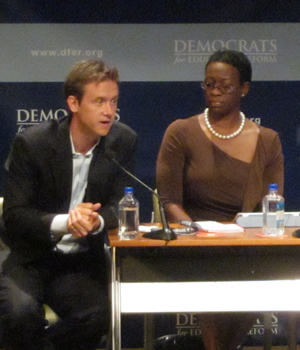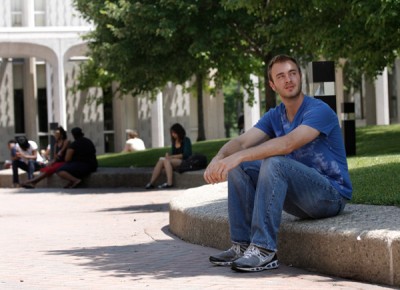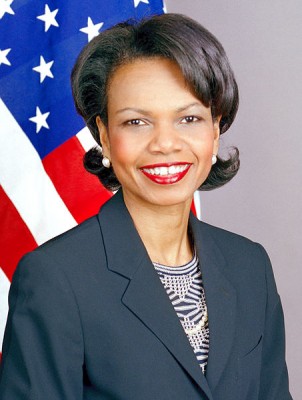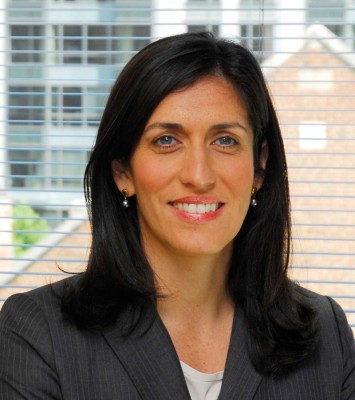
From the convention: Michelle Rhee on how Obama — or Romney — should change education
Michelle Rhee, former chancellor of Washington, D.C.’s public schools, thinks that Democrats have entered a new phase in their relationship with teachers unions. And she thinks a push by Republicans for local control of education is unquestionably wrong. A political – and often controversial – figure since she started as chancellor in 2007, Rhee will […]
Michelle Rhee, former chancellor of Washington, D.C.’s public schools, thinks that Democrats have entered a new phase in their relationship with teachers unions. And she thinks a push by Republicans for local control of education is unquestionably wrong.
A political – and often controversial – figure since she started as chancellor in 2007, Rhee will be spending this election season focused on state-level policies. She started her organization, StudentsFirst, to create a counterweight to union political pressure. The organization provides support to politicians of both parties who promise to work for statewide education reforms.
The new effort does not mean that Rhee, a Democrat, doesn’t have opinions about what’s happening on the federal stage. The Hechinger Report sat down with Rhee at the Democratic National Convention to find out what she thinks about President Barack Obama, Mitt Romney and the direction her party is headed in.
Here are some highlights from the conversation:
On the Democrats’ “new day”:
Traditionally, Democrats have not gone against the teachers unions – and many still won’t, Rhee said. But the unions, which have often opposed things like the elimination of the first-in, last-out policy for teacher layoffs or merit pay, don’t hold the same political power they once did.
“It’s a new day for the Democratic Party,” Rhee said. “It’s not a monolith that’s just going to side with the teachers unions come what may.”
Rhee cited education resolutions that were passed unanimously by the U.S. Conference of Mayors this summer. They included supporting teacher evaluations that were 50 percent based on student performance and parent trigger laws — which allow for a majority of parents at a failing school to take it over.
“I think that tells you something,” Rhee said. Her husband, Sacramento, Calif., Mayor Kevin Johnson, chairs the education committee for the conference. “We’ve got a lot of people saying we support unions, we support collective bargaining, we definitely support teachers, but a lot of these policies are things that have to be looked at and things that have to be changed.”
On Obama’s performance – and what should come next:
Rhee praised the president’s education initiatives, including Race to the Top, which awarded federal money to states that promised to undergo a variety of education policy changes. But, she said, the concept shouldn’t necessarily stop there.
“There’s still a lot of other federal funding that there’s no accountability around,” she said. Title I funding, given to schools based on their low-income student enrollment, for instance, could be partly contingent on reforms, Rhee said. For the 2012-2013 school year, Congress approved $14.5 billion for Title I.
“It would probably be a big challenge for [the Obama administration politically,” she said. “The Republicans on the Hill don’t want to fund another batch of Race to the Top dollars. You could continue that dynamic forward with those title dollars.”
On Romney’s education plans:
A central piece of Romney’s – and the Republican Party’s – education platform involves pushing control back down to the local level, something Rhee says she “100 percent” disagrees with.
“We had 14,000 school boards in this country making the decisions for a long time and that is why we ended up where we ended up,” Rhee said, noting that often school boards aren’t composed of educators. “I don’t think local folks know everything.”
“We should not say, well, that kids in Jackson, Miss., should be held accountable to different learning standards to the kids in Beverley Hills to the kids in Worcester, Mass.,” she said. “These children are not going to be competing for jobs against each other. They’re going to be competing for jobs against kids in India and China, and we’re going to have to have a sense of how each of these kids is doing.”
That’s not to say that the federal government should dictate everything about education, Rhee said. She supports both national curriculum standards and the creation of a common assessment. States that fall short should face interventions as laid out by the U.S. Department of Education.
“You have to have a balance,” she said. “The federal government should set very clear standards … There should be flexibility with how we’re going to get there.”
On vouchers:
One area where Rhee and Romney find some common ground is in his proposal to expand vouchers for low-income students. But she’s cautious about being overzealous about this support.
“I think where some Republicans tend to go is they think they can take something like vouchers and that’s just the end all, be all,” she said. “’Let’s just voucherize the system and then we’ll solve all the problems’ … That point of view is – I think – naïve. ”
Students First has identified 37 policies that they think states should adopt in order to improve schools. “I just don’t think you can choose one thing,” Rhee said.
This story also appeared on NBCNews.com.
From the convention: What does a pro-charter president look like?
President Barack Obama and his challenger Mitt Romney have both thrown their support behind charter schools, publicly funded schools that operate outside of district rules. Obama gave states points in his Race to the Top initiative, in which states promised to undergo education reforms in exchange for federal money, for raising charter caps. Romney’s entire […]
President Barack Obama and his challenger Mitt Romney have both thrown their support behind charter schools, publicly funded schools that operate outside of district rules. Obama gave states points in his Race to the Top initiative, in which states promised to undergo education reforms in exchange for federal money, for raising charter caps. Romney’s entire education platform hinges heavily on school choice, including charters, vouchers and online schools.
At the Democratic National Convention, The Hechinger Report sat down with Nina Rees, President and CEO of the National Alliance for Public Charter Schools, to find out what she thinks of the candidates.
Q. Obama and Romney seem to have common ground on education, but one of the areas that they do differ is how far to take school choice. Do you see any differences in the way that they talk about school choice and charters?
A. If you look at Romney’s past statements about the Obama administration and Obama himself, the one area where he thinks the president has done good work has been in the area of education initiatives like Race to the Top. The key difference is school choice. He’s taken a step further by pushing states to be more aggressive in making choices available to their students, pushing the envelope on inter-district choice, which again hasn’t been mentioned in the Obama platform. Romney’s notion of federal involvement includes giving states more freedom from rules and regulations in exchange for greater information for families to make educated choices and access to those options, which is different from where the president is. His vision right now does include carrots and sticks and continues down the path of No Child Left Behind’s accountability mission, which is that there are going to be consequences if certain goals are not met.
Q. Which vision do you prefer?
A. The National Alliance is a nonpartisan group. We love the fact that charter schools are bipartisan. I think that it’s important to continue in that spirit. And both candidates, quite frankly, so far have been strong on the issue, so I can’t chose.
Leveraging that support in a meaningful way [is key]. You can be supportive but how much money are you going to put on the table? Or how much are you going to push on ESEA to make sure that the current funding streams are reaching the schools?
Q. Regardless of who is elected, what are some things you would like to see happen at the federal level in terms of charter school policy?
A. Certainly funding is a big issue. Making sure that charter schools continue to get access to startup funding is going to continue to be important. The other issue is making sure that the existing funding streams targeted at public education also reach charter schools, since charter schools are public schools. In a lot of cases, unfortunately they’re not getting their equitable share of funding from Title 1 [federal money given to schools with a certain amount of low-income students], from the Individuals with Disabilities Education Act. Beyond just increasing funding for the charter school programs, I think it’s also important to look at the laws in place and the regulations in place to clarify a little bit more the fact that charter schools can also apply for [federal competitive grants].
Broadly speaking any and all efforts around weighted student funding, making sure dollars are following children or encouraging states to make sure dollars follow children [is important]. Encouraging inter-district choice or statewide open enrollment also benefit charter schools. So making sure that those policies are promoted at the federal level would be important.
This interview has been edited for length and clarity.
From the convention: Education finally plays a starring role
Democrats came out strong on education Tuesday, in a night devoted to praising President Barack Obama’s first term in office and focusing on federal education programs and funding from the littlest learners to college students. It was a sharp contrast to the Republican convention last week, where education was mentioned mostly in passing until a […]
Democrats came out strong on education Tuesday, in a night devoted to praising President Barack Obama’s first term in office and focusing on federal education programs and funding from the littlest learners to college students.
It was a sharp contrast to the Republican convention last week, where education was mentioned mostly in passing until a speech by former Florida Gov. Jeb Bush championing school choice.
Shying away from Obama’s signature Race to the Top initiative, which spurred a slew of states to change their education policies, Democrats sought to draw a distinction between Obama’s willingness to spend on education – particularly in early education and higher education – and Republican challenger Mitt Romney, who Mass. Gov. Deval Patrick claimed had “cut education deeper than anywhere else in America” during his time as governor of Massachusetts.
In contrast, speakers pointed out Obama’s support for early education programs like the federally funded Head Start, which provides free preschool to low-income kids.
“He’s made sure more of our youngest children have the stable foundation that Head Start provides,” said Obama’s sister Maya Soetoro-ng. She noted that she and Obama “were blessed with a mother who taught us that education was the surest path from limited means to limitless opportunities.’’
Keynote speaker Julian Castro, mayor of San Antonio, Texas touched on the need for federally funded education programs. “We know that pre-k and student loans aren’t charity,” he said. “They’re a smart investment.”
And Ryan Case, a Pell grant recipient two semesters away from a bachelor’s degree in political science from the University of Colorado, took the stage to praise federal education funding and explain why it’s a major reason he volunteers for Obama.
“It wouldn’t have been possible if President Obama hadn’t fought for students like me,” Case said of his upcoming graduation. “There’s just no way I’d be able to pay for school without the Pell grant funding President Obama doubled.”
Pell grants, given to low-income students for higher education, are a major point of contention between Democrats and Republicans. President Obama has increased Pell grant funding, while Republicans have sought to decrease it or limit eligibility for the grants.
Case went on to say that Romney’s plan could reduce Pell grants. “We’d still work as hard,” he said. “We just wouldn’t see that hard work pay off. That’s the difference in this election.”
Also dropped in a few times? That Obama had taken out – and paid – his own student loans.
When they first married, First Lady Michelle Obama said during her speech, their monthly student loan payments were greater than their mortgage.
“We were young, so in love and so in debt,” she said. “That’s why Barack has fought so hard to increase student aid and keep interest rates down, because he wants every young person to fulfill their promise and be able to attend college without a mountain of debt.”
Keynote speaker Castro mocked Romney’s advice to students this summer, when he told them to start a business and borrow money from their parents if they have to.
“Gee, why didn’t I think of that,” Castro said. “I think [Romney’s] a good guy. He just has no idea how good he’s had it.”
The evening also featured a short speech from a veteran who was able to go to school though the Post 9/11 Veterans Educational Assistance Act of 2008. The bill, which pays for full tuition at public universities and partial tuition at private ones for those who served after Sept. 11, 2001, was signed into law under President George W. Bush. Obama, then a senator, supported and voted for it.
Nate Davis, a graduate of Xavier University and current director of veteran affairs at the school, praised the Obama administrations treatment of returning soldiers.
Gov. Patrick offered up another specific example – one of the few direct k-12 mentions of the night. Boston’s Orchard Garden Elementary School, he said, was one of the worst in the city just a year ago. But it’s risen to be one of the best in the state, partially through the help of policies promoted by the Obama administration.
“Today’s Republicans and their nominee for president tell us those [students] are on their own – on their own to deal with their poverty, with ill-prepared young parents, maybe who speak English as a second language, with an underfunded school; with neighborhood crime and blight, with no access to nutritious food,” Patrick said. “For this country to rise, they must rise… They must have a champion in the White House.”
From the convention: Unions need to be part of education reform, legislators say
Legislators from across the U.S. gathered at the Democratic National Convention Tuesday and discussed the need for unions to be a part of any real education policy changes. They also noted that that both unions and politics can get in the way. A town hall hosted by Democrats for Education Reform showcased feuds that have […]
Legislators from across the U.S. gathered at the Democratic National Convention Tuesday and discussed the need for unions to be a part of any real education policy changes.

State Senator Michael Johnston (D- Colo.) and State Senator Nina Turner (D- Ohio) at town hall hosted by Democrats for Education Reform.
They also noted that that both unions and politics can get in the way.
A town hall hosted by Democrats for Education Reform showcased feuds that have erupted in many states as legislators have tried to push through a litany of education reforms that unions do not necessarily support – such as the use of student test scores in hiring and firing.
And who has been at the helm of many of these bills? Democrats, traditionally seen as the pro-labor political party.
The town hall in Charlotte comes at a time when DFER’s influence is growing. Founded five years ago, the organization works to elect Democrats committed to making drastic changes to state education policies. DFER attended the Democratic convention in 2008, “but this year brings a bigger audience and stature for the group,’’ the New Jersey Spotlight noted.
Examples of the group’s influence became clear when legislators spoke of what is happening in their states.
Marcus Brandon, a member of the North Carolina State House, was the only Democrat to vote for a 2011 bill that lifted the state’s cap on the number of charter schools that were allowed to open. Brandon lamented the political wrangling that kept charters from being required to provide lunch or transportation to low-income students.
Nina Turner, of the Ohio State Senate, discussed how an education reform bill for Cleveland, a city under mayoral control, was crafted with union input and two Republicans and two Democrats working together.
“We held hands the whole way through,” Turner said of the bill, which includes opportunities for new charters to open and changes to the teacher layoff process.
Teresa Ruiz, the state senator in New Jersey who was a driving force behind a bill that changed teacher tenure, was also able to get the union in her state on board.
“We shifted from calling it a compromise to calling it a collaboration,” Ruiz said. Still, Ruiz noted that the bill didn’t go far enough in her opinion; for instance it does not eliminate the first-in, last-out teacher layoff process.
“There is a level of fear,” she said of legislators who are unwilling to go against teacher union requests. “There is a group that can really make a difference [in re-elections.]”
When the presidents of the country’s two teachers union took the stage in the second panel, though, they were in agreement – as they have been – with the need to eliminate poor teachers to improve schools.
Their presence at the convention comes at a time when the relationship between the union and President Barack Obama has been somewhat frayed, the Los Angeles Times and others have noted. It also comes amid protests of the movie, “Won’t Back Down,” which stars Maggie Gyllenhaal as a single mother trying to get her daughter out of their failing public elementary school.
Randi Weingarten, president of the American Federation of Teachers, has denounced the film for portraying teachers and their unions as stereotypes and objects of blame.
At the Town Hall, both Weingarten and Dennis Van Roekel of the National Education Association spoke of a different subject: the potential for technology and online classes to support education, although they argued that the concept of “school” as we know it, won’t disappear.
“Unless you can make where [students] come from and where they live [equal]… there’s got to be a place where I can go to get what I need to follow my dreams,” Van Roekel said.
John Katzman, an education entrepreneur whose companies include the Princeton Review and 2tor, which partners with universities to provide online classes, envisioned a future of education full of networks of schools, all catering to different learning styles or focuses.
This would extend to union contracts, he said, advocating an end to a “one size fits all” approach to negotiations within a district.
“Our different goals dictate that there are different schools,” he said. “We don’t have to have all schools alike.”
From the convention: How can we fix higher education?
Charlie Nelms, former chancellor of North Carolina Central University, wants to send higher education faculty members back to school. Speaking at a panel during the Democratic National Convention in Charlotte, Nelms stressed the need for college and university professors to “teach people, not content.” Nelms believes that faculty members who went through postsecondary education years […]
Charlie Nelms, former chancellor of North Carolina Central University, wants to send higher education faculty members back to school. Speaking at a panel during the Democratic National Convention in Charlotte, Nelms stressed the need for college and university professors to “teach people, not content.”

Jake Boyd, photographed on the campus of Macomb Community College in Warren, MI. Boyd took five years to finish a criminal-justice degree while working two jobs at the same time he was going to classes. (ROB WIDDIS/Special to MCT)
Nelms believes that faculty members who went through postsecondary education years or even decades ago are not equipped to teach today’s students. He and his fellow panelists also mentioned the need to retool work study programs so they become more relevant to students. Other suggestions included improving the use of technology in higher education and pushing remediation into high school – all to help more Americans get a degree.
The ideas were vetted during The College Advantage, a panel focusing on ways to improve higher education attainment for students, which happens to be President Barack Obama’s signature American Graduation Initiative.
Obama has called for 60 percent of Americans aged 25-34 to have a postsecondary degree of some kind by 2025. The Lumina Foundation, which hosted the panel, shares those goals, which so far appear to be falling short. (Disclosure: The Lumina Foundation is among The Hechinger Report’s many funders.)
For decades, those with only a high school diploma had ample opportunity to be a part of the middle class, explained Anthony Carnevale, director of the Georgetown University Center on Education and the Workforce. That opportunity started decreasing in the 80s, he said, and accelerated during the recent recession.
By far the most jobs lost in recent years were those requiring only a high school degree and no education requirements, according to recent research by Carnevale’s group. And unlike jobs requiring some college or a bachelor’s degree – which Carnevale said are growing again – jobs for those with only a high school degree continue to fall.
“They’re gone and not coming back,” Carnevale said. “To the extent that we keep looking for those jobs, we’re looking in the rearview mirror.”
And while college enrollment is up, it’s not going to stay that way, Carnevale said. “During the recession a lot of people ran into college,” he said. “It was a good place to hide.”
Enrollments are now dropping, with more schools having space available than at any time in at least a decade.
Panelists were clear that the main problem is not access to higher education but degree attainment, particularly for minority males.
Nelms thinks the issue should be tackled by black and Latino groups and leaders.
“If we wait for the white power structure… to initiate that conversation, it’s not going to happen,” he said.
Aaron Smith, executive director of Young Invincibles, a group that represents the voices of 18-34 year-olds in policy discussions, was also concerned about student loans policies and the possibility they may dissuade people from going to college. And Smith also wants to see more opportunities for education and the workforce to connect. He advocates sending college students to local companies and asking them for work study or internship opportunities.
American Chamber of Commerce Executive President Mick Fleming said the business community “has been slow to the table on higher education,” while very involved in the K-12 years.
“Everybody in the business community is saying what do we fix? The ‘what’ becomes the next step.”
Fleming had an answer. “[We need to] start to say this is what we need, and actually express it,” Fleming said.
From the convention: Bush tells Democrats to ‘choose’ between unions and kids
Education finally got its place in the spotlight Thursday during the final night of the Republican National Convention, although it wasn’t Mitt Romney who put it there. It was Former Florida Gov. Jeb Bush who delivered the GOP message, devoting his entire speech to improving education — his signature issue while in office and his […]
Education finally got its place in the spotlight Thursday during the final night of the Republican National Convention, although it wasn’t Mitt Romney who put it there. It was Former Florida Gov. Jeb Bush who delivered the GOP message, devoting his entire speech to improving education — his signature issue while in office and his top priority out of it.
Bush was joined by a teacher and a former Florida student to hammer his points home, and his speech represented the clearest attempt so far of Republicans to separate themselves on education policy from the Democrats – who Bush referred to as “masters of delay and deferral.”
Bush hit hard on the two areas where the two parties have the least common ground, school choice and relationship with unions. And he presented a black-and-white option:
“Choose,” he said. “You can either help the politically powerful unions. Or you can help the kids.”
Romney momentarily touched upon his school choice policies later in the night, during a nomination acceptance speech that focused more on his own background and Obama’s shortcomings.
It was Bush who did the heavy lifting to sell Romney’s education plan. But it wasn’t that long ago that he and President Obama were on the same side, though, says Valerie Strauss at The Answer Sheet.
“In March 2011, when Wisconsin teachers were battling with Gov. Scott Walker after he moved to strip them of most of their collective-bargaining rights, President Obama flew to Florida and shared a stage with Bush,” Strauss wrote. “Obama even called Bush a “champion of education reform.” Thursday night, of course, Bush slammed Obama in his speech, saying his policies have failed but never mentioning how much the two men have in common on school reform.”
On Thursday night, Bush argued that increasing school choice was a necessity to fix the country’s education system, even though teachers unions traditionally oppose charter schools and voucher programs. The Obama administration, which has thrown its support behind charters, has not pushed for vouchers.
“The sad truth is the equality of opportunity doesn’t exist in many of our schools. We give some kids a chance, but not all,” Bush said. “Let’s give every parent in America a choice about where their child attends school.”
Bush highlighted Frantz Placide, a Miami native and 2010 graduate of Wagner College,as a success story from Bush’s voucher program. Placide used his voucher to enroll in Miami – Archbishop Curley Notre Dame, a Catholic high school.
The voucher program was ruled unconstitutional in 2006, but Florida still has a tax credit scholarship program for low-income students. Vouchers will be on the ballot in Florida once more in November.
Romney has proposed a national system that would allow low-income and special needs students to be able to enroll in any school – public or private – with public funding. Bush praised his plan and sent another barb President Obama’s way.
“[Romney] believes parents – regardless of zip code or income – should be able to send their children to the school that fits them best,” Bush said. “That has set him against some entrenched interests. There are many people who say they support strong schools but draw the line at school choice.
“’Sorry, kid,’” Bush continued. “’Giving you equal opportunity would be too risky. And it will upset powerful political forces that we need to win elections.’”
His talk also simultaneously praised “great teachers” and implicitly criticized others.
Sean Duffy, a teacher at Texas’s Del Valle High School, spoke of “good teachers” leaving the profession for more money and “bad teachers” getting locked into the system, arguing that students should be put first.
“We need more great teachers like you,” Bush told him. “Teachers who don’t give up on a kid, who recognize that every child can learn and don’t waste a precious year of a student’s life.”
Bush acknowledged that teaching was a challenging job, but argued it boiled down to an easy formula. “If you follow some core principles, and you challenge the status quo, you get great results,” he said.
From the convention: college students talk youth vote, higher ed cost
Vice Presidential candidate Paul Ryan’s joke from his Wednesday night speech about how t his IPod playlist compared to presidential candidate Mitt Romney did not impress a group of journalism students from Lynn University in Boca Raton, Fla. Five students from the school, where the third presidential debate will be held in October, have spent […]
Vice Presidential candidate Paul Ryan’s joke from his Wednesday night speech about how t his IPod playlist compared to presidential candidate Mitt Romney did not impress a group of journalism students from Lynn University in Boca Raton, Fla.
Five students from the school, where the third presidential debate will be held in October, have spent the week in Tampa covering higher education in the election, interviewing protesters and officials who are striving for their attention – and their votes.

Lynn University students Ricky Freebery, Tamara Reyes, A.J. Mercincavage, Sophia Barrett and Patricia Lammle have been covering higher education issues at the Republican National Convention. (Photo courtesy Andrew Vermes/Lynn University)
It’s clear they are missing the mark. The overall impression from these college students is that the Romney campaign is failing to connect with young voters and not talking enough about higher education.
“It’s obvious that they’re trying to get us involved,” graduate student Tammy Reyes said of Ryan’s iPod crack. “They’re not being very successful.”
Reyes, a foreign student from Nicaragua, believes lighthearted jokes about technology should be replaced with substance and discussions of issues that directly affect young voters – like college costs.
One major point of contention between Democrats and Republicans is how much government should subsidize tuition costs. The Republicans, for instance, have sought to cut funding to the Pell grant program, which provides funding for low-income students to pay for college, and tighten eligibility requirements for Pells.
The Republicans argue that increased government subsidies of higher education only serve to drive up tuition costs for all.
A.J. Mercincavage, an undergraduate Pell grant recipient himself, can understand some of their argument, but supports keeping the program intact.
“I think it’s really important for underprivileged students,” said Mercincavage, a senior at Lynn.
Overall, students found that education was not emerging as a hot button issue; They said the protesters they talked to were far more concerned with issues such as s Romney’s Mormonism.
The students also said that some education topics – – like special education or international student visas – were being ignored by Republicans and Democrats alike.
Patricia Lammle a student from Nicaragua studying for a master’s degree, was concerned about policies that made it hard to stay in America after coming here for school, and about a lack of action on President Obama’s part to make it any easier.
“I know Obama has said we should help the students who come here,” she said. “He just says the broad idea and then that’s it.”
From the convention: A Romney adviser on how he’d take on unions and school choice
Presidential candidate Mitt Romney has attempted to make his philosophy about how to improve American education widely known and easily accessible in recent weeks. But he hasn’t answered many specifics on the campaign trail. The Hechinger Report spoke with Jim Peyser, a member of Romney’s education team and a partner at the NewSchools Venture Fund, […]
Presidential candidate Mitt Romney has attempted to make his philosophy about how to improve American education widely known and easily accessible in recent weeks. But he hasn’t answered many specifics on the campaign trail. The Hechinger Report spoke with Jim Peyser, a member of Romney’s education team and a partner at the NewSchools Venture Fund, to find out more. Peyser also served as an adviser to Romney during his years as Massachusetts governor.
Here are some highlights of the conversation:
On what we could expect from the reauthorization of the Elementary and Secondary Education Act (ESEA) — which funds and defines the federal government’s role in the nation’s school — under Romney:
ESEA will likely be reauthorized under our next president. (Republicans and Democrats alike have criticized the current iteration of the law, the No Child Left Behind Act or NCLB.) Under a Romney administration, expect the focus to be “more about taking things out than putting things in,” Peyser said.
Romney has already said he would eliminate the No Child Left Behind requirement that core classes be taught by highly qualified teachers. This portion of the law defines a highly qualified teacher as one who has a degree in the subject area he or she teaches.
Peyser said a Romney administration would retain NCLB’s focus on assessments and accountability for schools and districts, but would likely minimize the consequences for schools that fail to meet standards.
“Those [consequences] have a minimal impact on what states and districts actually do. It ends up being more of a compliance exercise,” he said. “Those sorts of things would probably go away.”
Any bill produced would be consistent with Romney’s overall platform. “In general what he’d be looking to do is have a more narrowly focused federal education framework that is more targeted towards providing parents with greater choice,” Peyser said. “[It would be] less about micromanaging and establishing broad federal mandates.”
On how a Romney administration would take on teachers unions:
Although Republicans commonly criticize President Obama for not being tough enough on teachers unions, Peyser acknowledges that – especially with Romney’s goal of avoiding new mandates – a Romney administration would be limited in how it could enforce changes that some teachers unions balk at – such as new teacher evaluations or tenure reforms. Work rules for teachers are typically controlled at the state or local level.
That doesn’t mean there would be no role for Romney, though. “The federal government can do things that either reinforce or provide incentive one way or another,” said Peyser.
The highly qualified teacher provision of NCLB, for instance, reinforced a salary structure in which teachers are awarded pay bumps based on the number of years they teach and number of degrees they earn, rather than how well they perform in the classroom, he said. “It’s reinforcing the basic structures that are enshrined in collective bargaining agreements,” he said. “It’s things like that – being more sensitive to these federal mandates and the way they play out on the ground.”
Peyser also added that Romney would support the development of more charter schools, which often operate outside of union contracts, and that he would use the bully pulpit of the presidency to get his message across.
On school choice:
Increased school choice has become a signature issue for Romney – and the entire Republican Party. Romney’s white paper on education calls for putting more power in parents’ hands to choose schools for their children.
Yet, while parents care about academic quality, they might have a hard time evaluating it, Peyser said. An important component of expanded school choice would be having “information that is not only easier to get, but easier to understand,” he said.
“That’s only half of the equation,” Peyser said. “The other half is you have to have something to choose from.” Building up these quality options will take time. “It’s not a magic wand solution,” he said.
On how small “a heck of a lot smaller” U.S. Department of Education would be:
Romney told donors in April that he wouldn’t close the Department of Education. But he would consolidate it with another agency or make it “a heck of a lot smaller.”
Peyser said he didn’t know just how small we could expect the department to be under Romney but said it would certainly shrink substantially.
One likely target for cutting or elimination would be grant programs run through the federal government. Many were created decades ago and have narrow requirements and focuses, according to Peyser.
“There is a huge opportunity for both a lot of consolidation and elimination of those programs that should have a pretty significant impact on the scale of the federal Department of Education as well,” he said.
This story also appeared on NBCNews.com.
From the convention: Will private schools even take voucher students?
Expanding school choice is a central piece of Mitt Romney’s education platform. But allowing more public dollars to follow low-income and special-needs children to private schools — one of Romney’s main proposals for reforming American education– does not guarantee those schools will open their doors to them. For example, a private school not far from […]
Expanding school choice is a central piece of Mitt Romney’s education platform. But allowing more public dollars to follow low-income and special-needs children to private schools — one of Romney’s main proposals for reforming American education– does not guarantee those schools will open their doors to them.
For example, a private school not far from the convention center — highlighted on the GOP Convention website as one of Florida’s best independent schools — did not take part in Florida’s first voucher program, which was ruled unconstitutional in 2006. And Tampa Preparatory School — founded in 1974 by a group of Tampa citizens, including Al Austin, chairman of the 2012 Tampa Bay Host Committee for the Republican convention — does not participate in the state’s current school choice programs.
Florida has a voucher program for special-education students and a tax credit scholarship program in which taxpayers are able to receive credits for donations made toward private school scholarships for low-income students.
As it turns out, many of Florida’s independent schools, which are a small subset of private schools that aim to be entirely independent from the government, do not take any form of public money on philosophical grounds.
“Vouchers have not impacted us significantly one way or the other,” said Barbara Hodges, executive director of the Florida Council of Independent Schools. The group accredits 159 independent schools across the state, including Tampa Prep. “It does not mean that we are supportive or non-supportive [of vouchers]. Part of being independent means that, typically, our schools do not take tax dollars.”
Tampa Prep, which serves grades six through 12, stresses student participation and the development of self-confidence. It’s open to students of all backgrounds, its website says. The middle school costs $18,375 a year, if paid in two installments in June and December, and the high school costs $19,025. The school supplies its own financial aid to help families unable to cover the full cost of tuition.
Robin Kennedy, the school’s Director of Alumni Relations and Communications, said in an email that the school had looked into vouchers, but so far has chosen not to participate.
Other Florida private schools say they would welcome an expanded voucher system. Many parochial schools around the country have struggled in recent years to stay afloat financially.
“[Romney’s plan] is definitely something we’d follow with interest,” said James Herzog, associate director of education for the Florida Conference of Catholic Bishops, which oversees the state’s Catholic schools. “We think it would make a big difference to our schools.
Although not all of Florida’s Catholic schools chose to take part in the state’s current school choice programs, the majority do, Herzog said, and the number grows each year.
“Most of the schools do say it’s a way to … make schools more accessible and affordable,” Herzog said. “We just wish there was more available for the middle class.”
From the convention: Condoleezza Rice talks educational ‘crisis’
Former Secretary of State Condoleezza Rice joined a long list of politicians—including both Mitt Romney and President Obama—describing education as the “civil rights issue of our day” in her speech at the Republican National Convention Wednesday night. “We need to give parents greater choice—particularly poor parents—whose kids, very often minorities, are trapped in failing neighborhood […]
Former Secretary of State Condoleezza Rice joined a long list of politicians—including both Mitt Romney and President Obama—describing education as the “civil rights issue of our day” in her speech at the Republican National Convention Wednesday night.
 “We need to give parents greater choice—particularly poor parents—whose kids, very often minorities, are trapped in failing neighborhood schools,” she said. “If we do anything else we condemn generations to joblessness and hopelessness.”
“We need to give parents greater choice—particularly poor parents—whose kids, very often minorities, are trapped in failing neighborhood schools,” she said. “If we do anything else we condemn generations to joblessness and hopelessness.”
Describing the “crisis in K-12 education” as a “threat to the very fabric of who we are,” Rice spoke of the need to get great teachers into schools as well as to expect more from students. “We need to have high standards for our kids because self-esteem comes from achievement and not lax standards and false praise,” she said.
Outside of Rice’s speech, education was mentioned only peripherally during a night focused again on America’s economy. When education did come up, most speakers addressed college—its rising costs and the job prospects for its graduates.
“College graduates should not have to live out their 20s in their childhood bedrooms, staring at their faded Obama posters,” Vice Presidential nominee Paul Ryan said.
He echoed earlier statements of Senate Republican Leader Mitch McConnell (R-Ky.) in describing the “recent college grad facing up to the painful reality that the only door open to her after four years of study and a pile of debt is her parents’.”
Michelle Voorheis, a family-business owner interviewed “backstage” at the convention, spoke of her financial worries, which were amplified by the fact that she just sent a son off to college.
Representative Cathy McMorris Rodgers (R-Wash.) also spoke personally. “I was the first in my family to graduate from college,” she said. “So I know how important that is to the American dream.”








